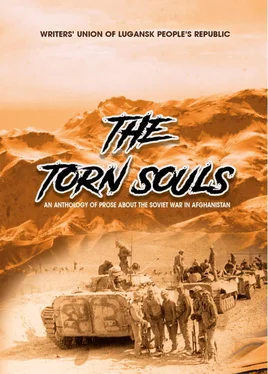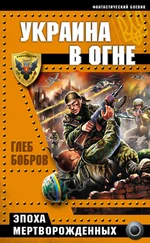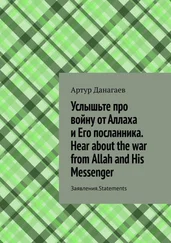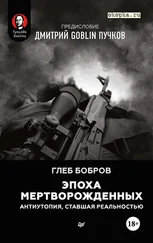— That was something else! Wow, that was something else. Ha-ha-ha!
— Nick the whole crop! I’m going to kill myself laughing!
— Think, guys — a bear growing cannabis!!
The demobees (see “Terminology and Glossary” — Editor) heaved, groaned and scrambled down from their bunks. Even Vitka was affected and joined the general hysteria. He peered over the top bunk and nearly fell off. Only Babay looked blank, turning his head from side to side with a dazed smile. When Kolya saw that Babay had entirely missed the point, he whispered through his tears:
— Bash him too: then he’ll be as stoned as the hare!
Something clicked in Babay’s head. He too began to laugh, panting and yelping and repeating: Nick the crop! Nick the crop!
The laughter went on and on. We gradually calmed down a bit, and Vitka tried to tell another long-drawn-out joke about the Lilliputian who picked up a bit of hash on Gulliver’s hand. But just when he got to the point where Gulliver, tired of waiting for the idiot to get enough together for a proper smoke, tells him to sort himself out somewhere else and rolls the cigarette for himself, someone else burst out: “Nick the crop right now!I” and the boys collapsed with laughter all over again.
It took them at least half an hour before they finally calmed down a bit.
— How about some music, guys? — said Kolya. Alyosha backed him: — Why not? Come on Vitka, give us one of our tunes!
Vitka himself had already been feeling for some time that he needed to play. He jumped off the bed, picked up the guitar standing at its head, and began to tune it up. The ancient instrument was past its prime and hard to tune. The tuning pegs kept sticking, the strings kept cutting into his finger pads. Nevertheless, even an inadequate instrument made a great difference to their boring life. Only five men from the entire troop could strum out even a few chords, so Vitka, who did have a certain skill, was regarded for a long time as the only capable guitarist around. But then he was displaced by a young soldier from the Second Company who had a genuine musical education, He was a professional, he could play the accordion as well as the guitar, he knew many songs, both funny and sad; for three months he had been giving concerts every evening for the benefit of the senior soldiers. All those months Vitka had been resting, waiting for his finger pads to heal. Then people got sick of the new musician’s songs, which were all about civilian life, and demanded a return to their old favourites, the ones which Vitka had learned from tapes of the “Cascade” (see Terminology and Glossary” — Editor) ensemble.
— What shall we sing, Kolya? — Viktor asked as he picked out the first chords and flexed his fingers.
— What about “Tracer” to get us going? — suggested Soltan: it was Kolya’s favourite song.
Without waiting for any other ideas, Vitka started to play:
“…The blue sky is over our heads, and our hands can reach out to the stars!”
Several voices joined the chorus. Kolya, carried away, shouted out:
“Just listen to the tracer as it flies
And drones through the silent night.”
Then Vitka went straight into “Dawn”: slow and sad. No one objected. Most of the boys fell quiet, some joined in gently. Yakubzhon screwed up his narrow eyes, whispering the strange Russian words:
“…and in the morning, along unseen paths
We’ll again explore the Afghan land.”
Suddenly Alyosha broke in forcefully. The words of the song had bitten into him for two long years: now they struck a chord with what he was thinking at that moment, and he poured out all his frustration at the endless waiting:
“The guitar speaks of the frozen dew,
Of young girls and their golden hair.
Guitar, you can end your song without sadness!
After all, you and we both
Serve in Badakhshan.”
Vitka realised that he had hit the mark. All the demobees in the corner had been hooked by the music. Sometimes a musician catches the mood of his audience and instinctively plays what they want to hear. Then each feels as if he is part of the music. Each takes part in creating the song, whether or not he has a good voice or a good ear, whether he remembers the words or not, even if he does no more than accompany the simple tune with a primitive mumbling. That’s just what happened now. Stimulated by the drug, their minds could produce ready answers to barely formulated questions: there was no need to think, to analyse, to ask where the song should go next. His eyes on his listeners, his hands and fingers functioning automatically, his voice reproducing the practised words, the player could guide the disorganised chorus into the right pitch, and pin down the outburst of emotion called up by the song. When they came to the last verse, Vitka could see tears in the corners of the eyes of the listeners, and he put his whole soul into the final phrases.
“The horizon expands
As the soldier goes home,
We will walk with our friends
Towards the plane.
Until it lifts us
Over the land,
And strikes out towards
Our homeland at last.”
He saw the faces of his friends changing as he sang. The coarse soldier’s faces that had got on his nerves for two whole years suddenly became the faces of twenty year old boys. Their shorn heads made them look particularly young and naОve. Could you call them warriors? Hell, they were no more than schoolboys, greenhorns who still know nothing about life. They were merely pretending to be grown up: behind their coarseness and cruelty they hid half-formed young souls, pining for their distant homes, their families and their homeland. What did they know of the realities of adult life, these boys who had been torn from their everyday life at the age of eighteen and hurled into a strange and incomprehensible land? How would they live when they got home and came up against the realities of civilian life? Now they only thought of one thing: how they would soon be out of this crazy Afghanistan, of which they were so heartily sick. They would forget everything they had learned here. In no more than a few days, a couple of weeks at most, they would be back in the Soviet Union, face to face with an incomprehensible new life. How would they live there? How would he be received?
“No”, — thought Vitka. It was not a matter of “they” and “I”, but “we”, all of us! Here we had all become to resemble one another, regardless of where we came from, our upbringing, our way of life and our education. Now we all know the same things, and are ignorant of the same things. We know how to place our feet carefully on the stones as we climb a hillside in the dark. We can march for dozens of kilometres over the mountains carrying thirty kilograms of weapons and ammunition. We know how to apply a tourniquet to stop the blood, how to dress a wound and inject a painkiller. We know how to kill a man! But we don’t know anything about how people live outside the army, what they think about, how they talk, how they sing. Our former life is an unreal dream. Will our present life also seem like a dream one day?
Vitka struck the final chord, slowly ran his fingers over the strings, and ended the song. All fell silent, not wishing to break the mood of sadness. So he decided to continue in the same mood and began to play “The Cuckoo” by Cascade, assuming that someone would pick up the words “I often remember my home”. But Alyosha put his fingers on the strings and asked:
— Vitya, how about the one about the cigarette, eh?
It was an old joke. The first time Alyosha made the request, Vitka spent twenty minute trying out one song after another with him, but could not find one which even mentioned a cigarette. Alyosha could not remember what the song was about, nor the tune, nor even a single line of the verse. He could only click his fingers and repeat: “Well, that one… There’s something about a cigarette in it.”
Читать дальше










